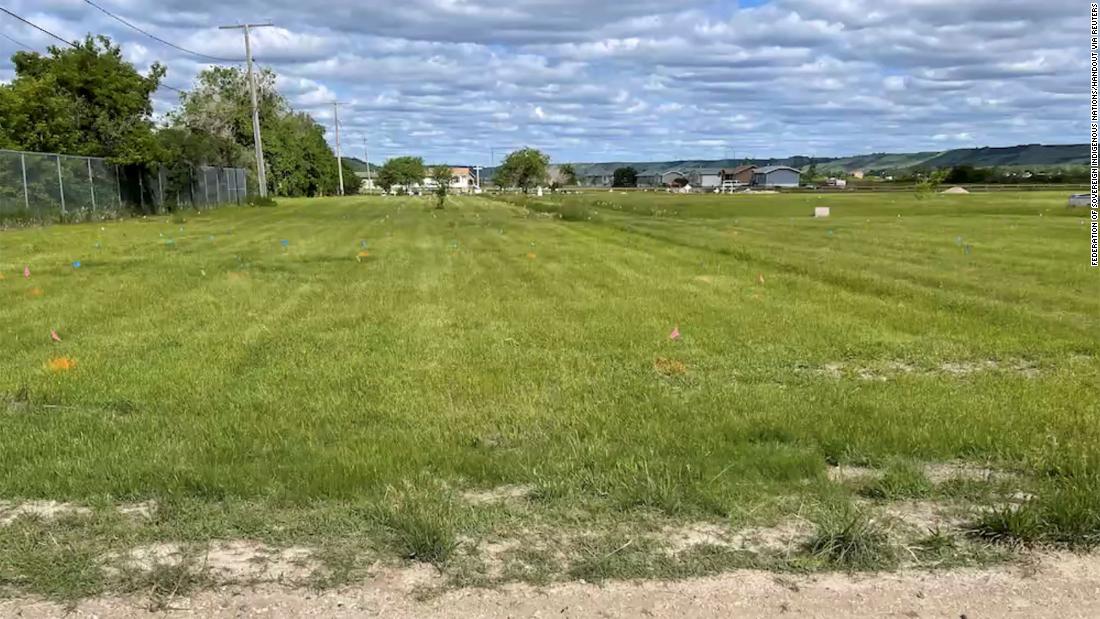(CNN)At least 750 unmarked graves have been found on the grounds of the former Marieval Indian Residential School in Canada, the Cowessess First Nation in Saskatchewan says.
The discovery was made in the days after Indigenous leaders began radar searching the school grounds on June 1, Cowessess Chief Cadmus Delorme told reporters Thursday in a news conference.
The search team didn't find a mass grave, Delorme said. They believe the headstones or markers for the hundreds of graves were intentionally removed.
The Federation of Sovereign Indigenous Nations said on Wednesday that "the number of unmarked graves will be the most significantly substantial to date in Canada."
"This was a crime against humanity, an assault on First Nations," Chief Bobby Cameron of the Federation of Sovereign Indigenous First Nations during the press conference. "We are proud people, the only crime we ever committed as children was being born Indigenous."
He added that Indigenous peoples would not stop until all the "bodies" of victims were found.

"The world is watching Canada as we unearth the findings of genocide. We had concentration camps here, we had them here in Canada, in Saskatchewan. They were called Indian residential schools. Canada will be known as a nation who tried to exterminate the First Nations, now we have evidence," Chief Cameron said.
The discovery comes after the remains of 215 children were found in late May buried near another boarding school in Canada and as the nation grapples with its dark history involving Indigenous people.
Children as young as 3 years were buried on school grounds of the Kamloops Indian Residential School in British Columbia, Canada, officials said last month.
Prime Minister Justin Trudeau said the findings at both former boarding schools "reaffirm the truth" what families, survivors and Indigenous communities "have long known," and the government will continue to provide funding and resources to bring "these terrible wrongs to light."
"They are a shameful reminder of the systemic racism, discrimination, and injustice that Indigenous peoples have faced -- and continue to face -- in this country. And together, we must acknowledge this truth, learn from our past, and walk the shared path of reconciliation, so we can build a better future," Trudeau said in a statement.
Cowessess First Nation Elder and Knowledge Keeper Florence Sparvier said her parents were threatened with jail time if they did not send their children to the Marieval School.
"They were putting us down as a people, so we learned how to not like who we were and that has gone on and on and it's still going on," said Sparvier during Thursday's press conference.
Children were expected to learn how to assimilate and become Roman Catholics, Sparvier said, while rejecting their own spirituality and culture.
"We learned, and they pounded it into us, and really they were very mean, when I say pounding, I mean pounding," Sparvier added.
Two Catholic religious groups, known as the Oblates, who were involved in operating many of the residential schools throughout Canada, including those in Marieval and Kamloops, released a statement this week, saying they intend disclose all historical documents about their involvement.
"We remain deeply sorry for our involvement in residential schools and the harms they brought to Indigenous peoples and communities," the statement reads.
According to the Oblates, they have worked to make historical documents available through partnerships with universities, archives and the Truth and Reconciliation Commission.
"While some progress has been made, this disclosure is not complete, and has been complicated by issues of provincial and national privacy laws," the statement said. "We further acknowledge that delays can cause ongoing distrust, distress, and trauma to Indigenous peoples across British Columbia, Saskatchewan, and the rest of the country."
Local leaders in Saskatchewan are contacting survivors and families to inform them of the remains, FSIN said.
"The first priority is the health, healing and wellness of the survivors and their families, as well as the community of Cowessess First Nation," said Larissa Burnouf with FSIN Communications.
The Cowessess Nation is near the community of Broadview, about 95 miles from the provincial capital of Regina.
Canada is bracing for more discoveries of similar unmarked, mass gravesites in the months to come as dozens of indigenous communities are expected to allocate funding and technical support to investigate former schools.
Previously, indigenous leaders and residential school survivors in Canada have called on officials to conduct a thorough investigation of every former residential school in the country after the remains of the children were found.
In 2015 Canada's Truth and Reconciliation Commission released a report detailing the damaging legacy of the country's residential school system. Thousands of mostly indigenous children were separated from their families and forced to attend residential schools.
The report detailed decades of physical, sexual and emotional abuse suffered by children in government and church run institutions.
The commission estimates that more than 4,000 children died while at residential schools over a period of several decades, but the final commission report acknowledges it was impossible to know the true number.
CNN's Dave Alsup and Rebekah Riess contributed to this report.

 3 years ago
2127
3 years ago
2127










 English (US) ·
English (US) ·